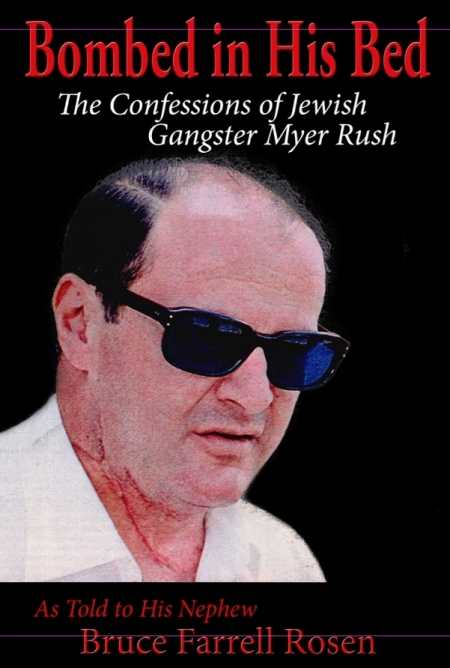Bombed in His Bed
The Confessions of Jewish Gangster Myer Rush
Themes of crime and redemption run through the life of a complicated “gangster.”
Bombed in His Bed, the biography of “Jewish gangster” Myer Rush, spans his boyhood to middle adulthood with an impressive and glorified account of his wily, criminal activities and, later, his prolific sense for business and acquiring wealth. The end of Rush’s story—wrongful imprisonment, attempts on his life—is fascinating, yet lacks the sort of narrative probing and prodding at the significance of these life events that bring other biographies a measure of literary success.
Rush’s nephew, Bruce Rosen, begins his account of Rush as a young boy, defending street corners to keep his share of the newspaper sales market. The young, truant Rush develops into a pickpocket and cat burglar, cultivating a talent for amassing large sums of money by stealing from the wealthy in hotels across North America. The first half of the narrative is a veritable list of criminal exploits and shady characters encountered during a life of crime. Eventually, with a few stints in prison under his belt, Rush resolves to put away crime and ravenously pursue investments and money-making schemes that will multiply his wealth into the millions. It’s in this second phase of life that corruption in his company, unbeknownst to Rush, irreversibly devastates the life and business he has built.
The writing is well crafted at the sentence level and Rosen succeeds in giving the reader a comprehensive account of his uncle’s early to midlife, at which point Rush’s activities and whereabouts become as elusive to the narrator as they do to the reader (by Rush’s design, one presumes). However, the biography is weak in developing the sort of tension between key events in the narrative that holds the interest of readers. There is perhaps too much detail about the ins and outs of Rush’s operations and travel; in addition, Rosen frequently delves into world or North American events (presumably to give us historical context), but does so without drawing much connection between these events and the man he writes about.
The biggest problem with Bombed in His Bed has to do with authorial perspective, which could be skewed due to the author’s relation to his subject. Rosen’s assessment of Rush’s life and activities is unsatisfyingly flat: Rush is a man who eats and breathes crime for the first half of his life, yet early on in the narrative of crime, Rosen refers to him as “an amazing human being” without qualification or acknowledgment of the criminal complexities of the man. Indeed, the book makes such proclamations at a time in the narrative when readers may find themselves growing in a general dislike for Rush, despite amazement at his ability to pull off such thievery. This inconsistency is unsettling.
Despite such complications in the first half of the book, Rosen may succeed in getting readers on board with his estimation of Rush’s likability by the end—after Rush has endured the poetic justice of imprisonment and persecution for crimes he didn’t commit and has, by all accounts, become a softer, more broken figure. It’s certainly likely that readers will walk away impressed by the enormity and magnitude of adventure contained in a single life.
Reviewed by
Heather Weber
Disclosure: This article is not an endorsement, but a review. The publisher of this book provided free copies of the book and paid a small fee to have their book reviewed by a professional reviewer. Foreword Reviews and Clarion Reviews make no guarantee that the publisher will receive a positive review. Foreword Magazine, Inc. is disclosing this in accordance with the Federal Trade Commission’s 16 CFR, Part 255.

